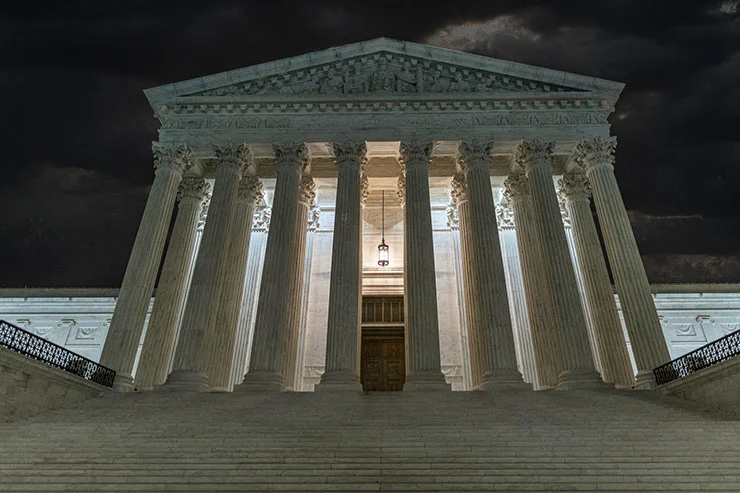The deep state is in a bind. Against all odds, Donald Trump won reelection and subsequently began taking an axe to the woke bureaucracy. His opponents in the media, the Democratic Party and, of course, the federal government initially struggled to stop him. But soon enough they converged on a strategy employed often during his first term: judicial review.
Federal judges have already blocked much of Trump’s agenda, including his executive order to end birthright citizenship, the deferred resignation program for government workers, his decision to shut down USAID, and the federal funding pause. According to some, such as Senator Sheldon Whitehouse (D-R.I.), this is nothing more than the rule of law in action. But that just isn’t the case. The motivations of these judges are entirely partisan and thus at odds with the founders’ concept of a neutral judiciary.
When drafting the Constitution, the founders went to great lengths to ensure the political neutrality of the judicial branch. Judges were to receive lifetime appointments, with the hope that by not having to worry about reelection or future career prospects, they could do their jobs without concern for politics. The founders further sought to safeguard the judiciary from political reprisal by preventing federal judges from experiencing salary cuts during their lifetimes.
The Federalist Papers shed much light on the founders’ intentions for the judiciary. In Federalist 78, Alexander Hamilton contrasts the nature of the legislative branch with that of the judiciary:
The legislature not only commands the purse, but prescribes the rules by which the duties and rights of every citizen are to be regulated. The judiciary, on the contrary, has no influence over either the sword or the purse; no direction either of the strength or of the wealth of the society; and can take no active resolution whatever. It may truly be said to have neither FORCE nor WILL, but merely judgment; and must ultimately depend upon the aid of the executive arm even for the efficacy of its judgments.
Pay close attention to the two words Hamilton capitalized: force and will. Unlike the legislature, the judiciary’s function was intended to consist of the mere exercise of judgment—not the forceful pursuit of partisan goals.
The Constitution worked remarkably well for a while. During the 20th century, however, the birth of the administrative state—often decried as the fourth branch of government—disrupted the separation of powers, resulting in a considerably different form of government than the one our founders bequeathed to us.
Professor John Marini outlines this transformation in his book Unmasking the Administrative State. “Of course, the Constitution still structures the institutions of American government,” writes Marini, “but the separation of powers no longer operates effectively on behalf of the principle of limited-government constitutionalism.”
And what of this transformation’s effect on the judicial branch? Marini writes, “In the administrative state, the courts have been required to enter the policymaking process… As a result, they have become fundamental players in the political and policymaking process.” In other words, the administrative state’s growth has rendered the judiciary political, contrary to the founders’ intentions.
As the administrative state grew, so too did the power and influence of federal bureaucrats. It is precisely this class whose interests the now-politicized judiciary seeks to defend. They certainly aren’t defending the American people, who put Trump in office knowing he would enact the very policies these judges are doing their best to block.
Many of these judges make no pretense of political neutrality. For an example just look at U.S. District Judge John McConnell Jr., the man responsible for blocking Trump’s federal funding freeze. McConnell, who established a “Diversity, Inclusion, and Racial Justice Committee” in his court, is on record stating in a 2021 interview that “racism is a white people problem.” He also once complained about the “lack of racial diversity in his court.”
It seems Judge McConnell has some recognizably far-left views. But he’s supposed to put these to the side when issuing rulings, in keeping with our founders’ intention for the judiciary to be neutral—to lack a political will of its own.
Not quite. In that same interview, McConnell pushed back against the ideal of a non-political judiciary:
So too often to really understand this, we fall back on a kind of stereotypical comment that judges should have no opinions and whatnot. And that’s just not true. If that were the case, we would have computers run our justice system and then we would input this and we would input that. We’d spin the wheel, and out would come a proper decision. But that’s not how justice works, nor should it work like that … I have opinions about a lot of things, some are relevant…
Yet, McConnell insists that “courts stand and enforce the rule of law that is against arbitrary and capricious actions by what could be a tyrant,” a term he of course means to apply to President Trump.
McConnell isn’t an outlier. He’s just saying the quiet part out loud. The legitimacy of the regime is derived in large part from its pretensions to political neutrality; in practice, it is anything but. When Donald Trump fired James Comey, we were told that this constituted the politicization of the government. But when the regime tried to put Trump in prison, that’s just the rule of law, buddy.
“No one is above the law,” posted Joe Biden the day Trump was found guilty in his absurd hush money trial. One can only marvel at the chutzpah required for a president to characterize the prosecution of the opposition candidate as proof of institutional neutrality.
Americans must reject rule by judges—kritarchy—by supporting President Trump in his battle against them. Whether it’s through appeals, judicial impeachment, or outright ignoring the court’s orders, the Trump administration must not relent. Cede not one inch of ground to these judicial partisans.

Leave a Reply